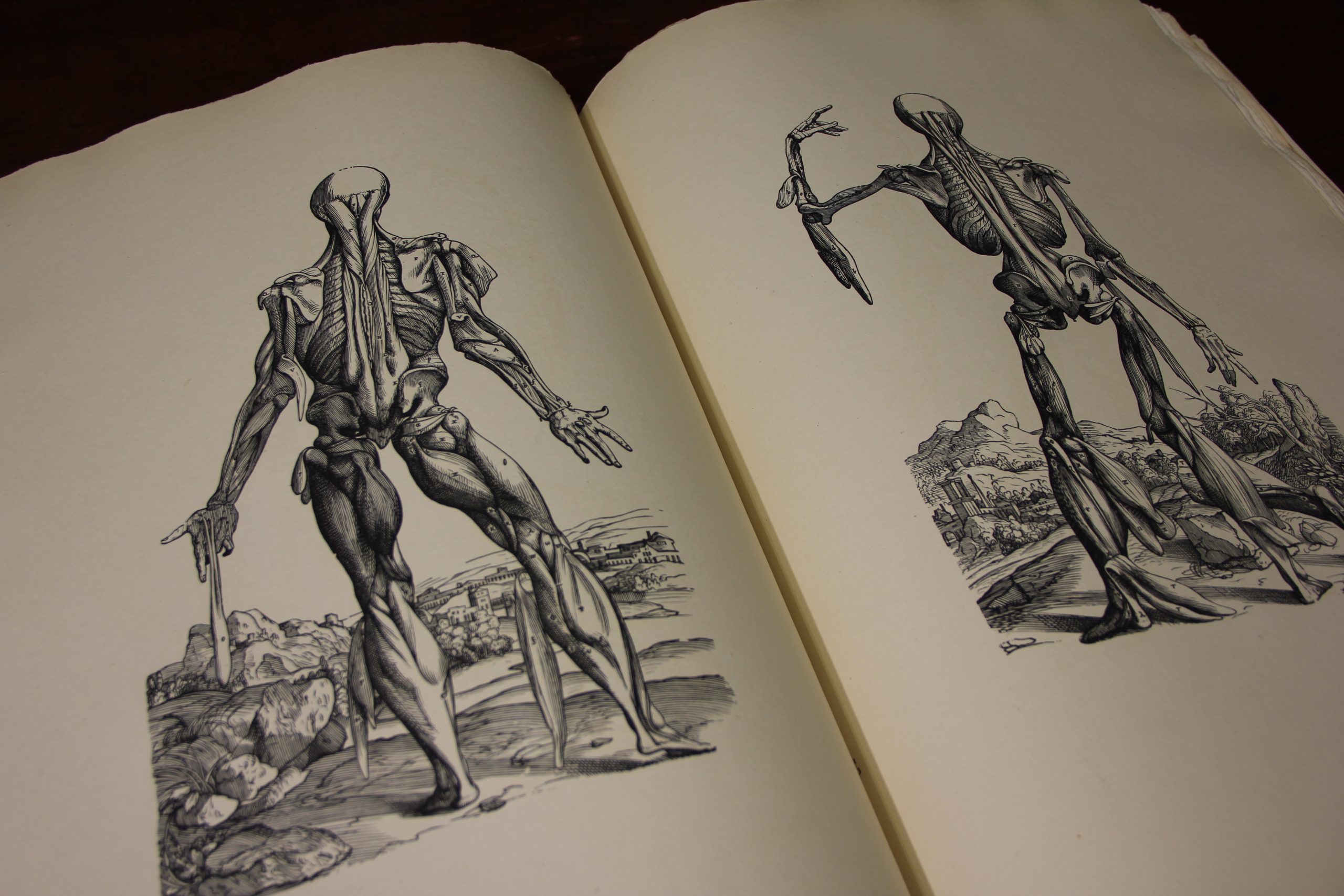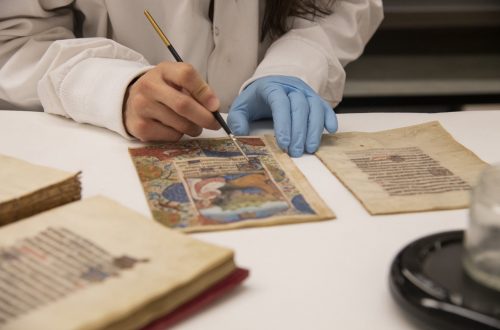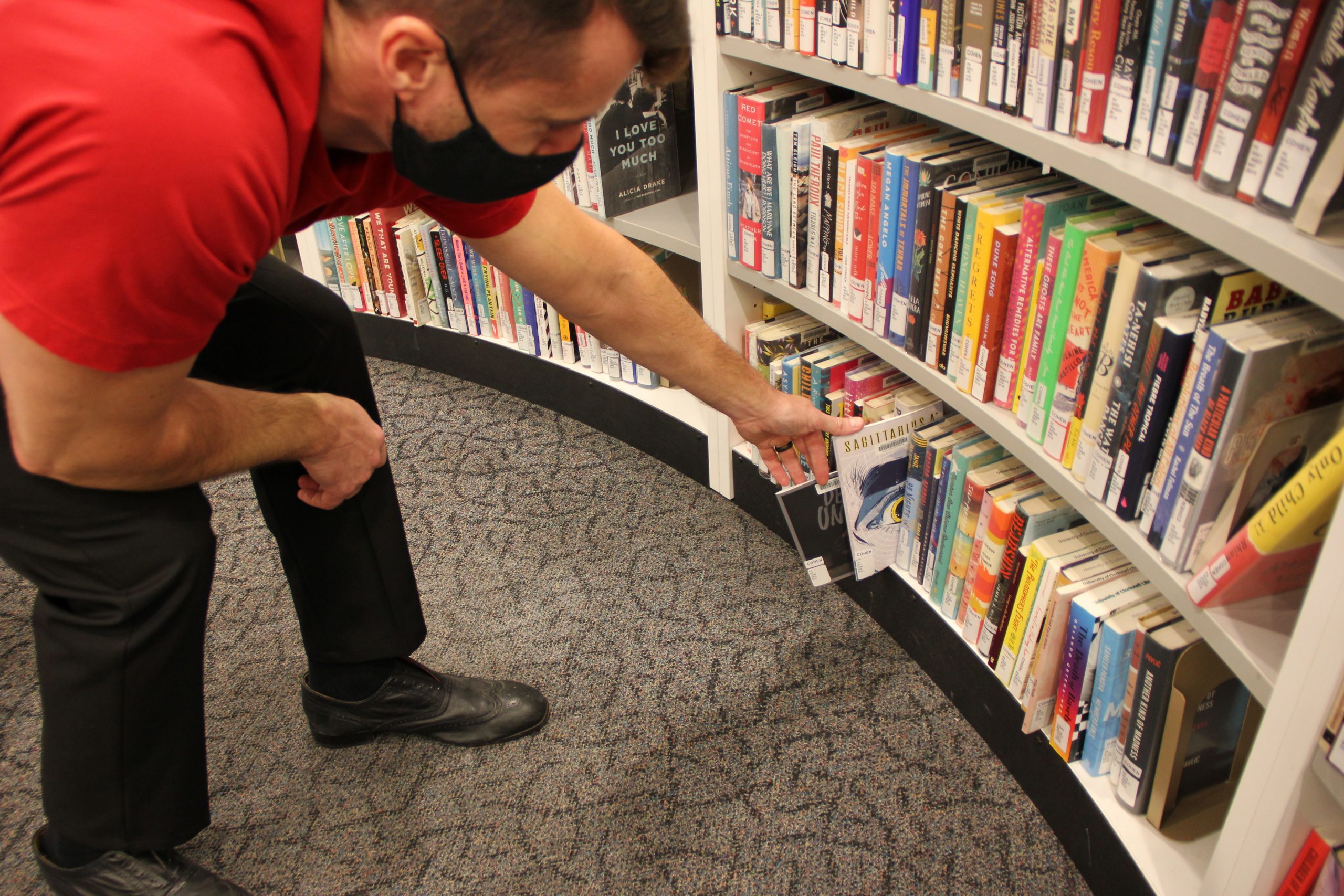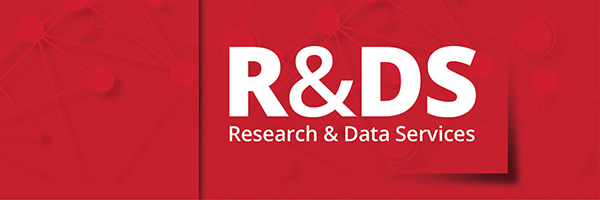
How the UC Libraries Research & Data Services Unit is redefining library data services
By Tiffany Grant, Research Informationist, Research and Data Services
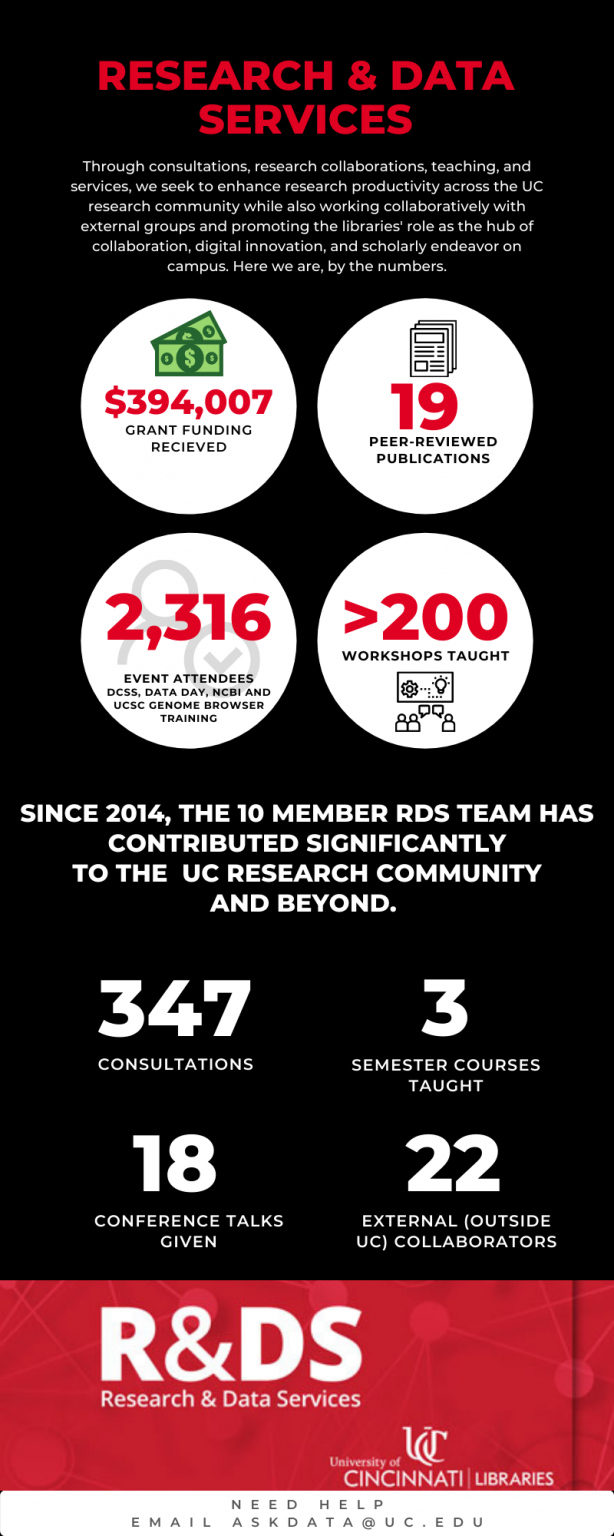
Academic research institutions recognized the need to provide strong, persistent and effective research data services to meet the data needs of researchers within their respective communities. The competition for dwindling research dollars, combined with the requirements to better manage, share and archive research data, prompted a strong push to create or expand services to facilitate these processes. Academic research libraries across the globe responded to these needs by hiring and training employees to address the needs of researchers at their respective institutions. Formed nearly seven years ago as part of the UC Libraries Strategic Plan, the Research & Data Services (RDS) Unit has sought to expand the reach of library services through data and to create a stronger, more productive and efficient research environment at the University of Cincinnati.
The mission of the UC Libraries RDS Unit is to inspire the creation of knowledge and enhance research productivity across the UC research community through the development and implementation of interdisciplinary research data services that enable research and promotes synergistic collaborations between UC Libraries and UC researchers. The RDS service catalog expanded significantly over the last seven years and includes services related to data and project management, data analyses, data visualization, and data cleaning/preparation and modeling. RDS members provide education and consultations on research tools/resources and best practices and have formed a number of research collaborations allowing them to become equal partners with many UC researchers. The UC Libraries RDS Unit is on par with national trends seen in other academic research libraries and the national research environment, and in some cases is a standout as it endeavors to expand library data services through research partnerships and education.
At its inception, the core RDS group was comprised of three informationists, Tiffany Grant, Don Jason and Amy Koshoffer. Informationists are librarians who have graduate training and practical experience in the biomedical, behavioral or biological sciences and library and information sciences/informatics. While both Amy and Don have been formally trained in library science, they also have 16 years of biomedical research experience and a Master’s Degree in Health Informatics, respectively. Tiffany earned her doctorate from the University of Cincinnati Pathobiology and Molecular Medicine Graduate Program in the College of Medicine. As the current co-leaders of the RDS Unit, Amy and Tiffany have a combined total of 30 years in biomedical research, providing an expert level of research knowledge and first-hand experience that has informed many of the service needs that RDS meets.
Over the last seven years, the group has expanded to include other core members, including Rebecca Olson, business and social sciences informationist, Dorcas Washington, data analytics specialist, as well as various student consultants, including Jenny Latessa. Also included are affiliated faculty members like Ted Baldwin, director of the Science and Engineering Libraries, Mark Chalmers, science and engineering librarian, Emily Kean, research and education librarian, and Maggie Patel, business and data analytics librarian. Rebecca is a certified Carpentries Instructor. Dorcas has a Master’s Degree in Applied Statistics and is currently pursuing a PhD in Biostatistics. Mark is a Drexel University LEAD Fellow where he is growing his competencies in the domains of data science, data integration and large-scale machine learning. Emily is the Health Sciences Library’s liaison to the College of Nursing, and she is simultaneously pursuing a PhD in Nursing Research. The cross-training received by RDS team members has provided each of them a unique perspective that spans the entire data life cycle, and has equipped them with the skills and ability to champion best practices related to research data practices. Member of RDS are housed in locations across the library system and are available to work with researchers across all domains.
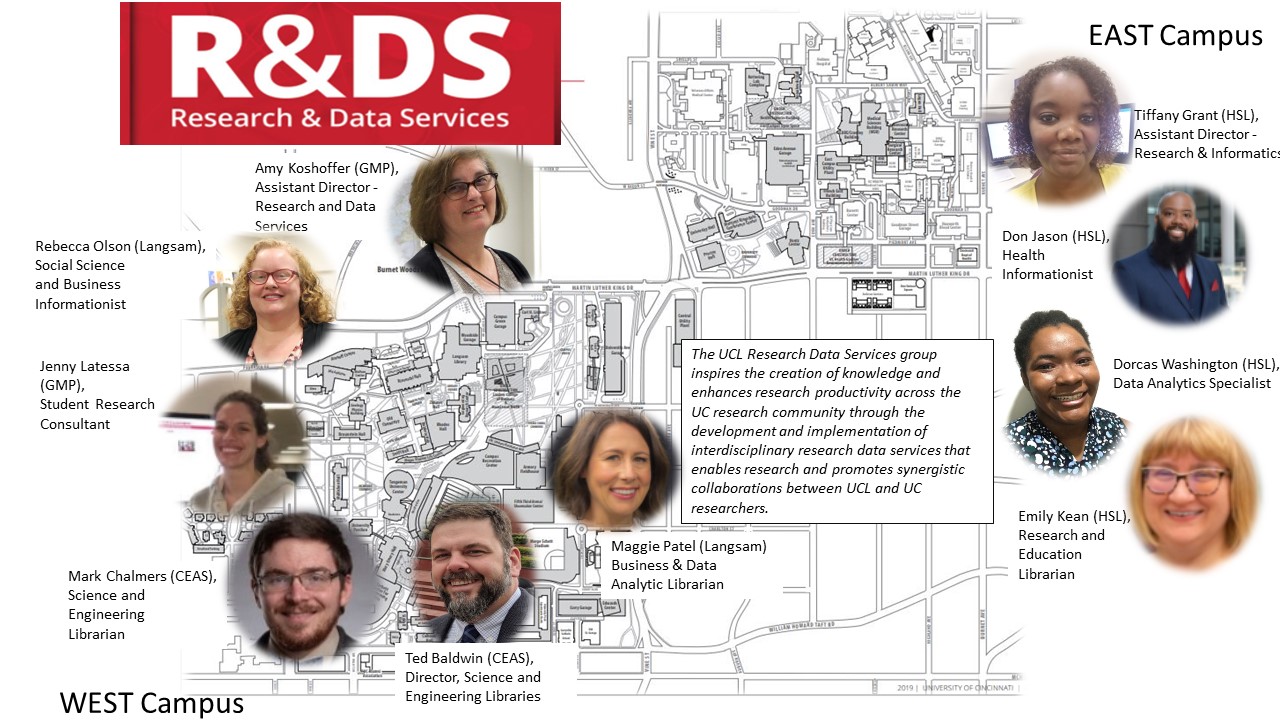
With their combined levels of education, experience and expertise, collectively, RDS has developed and implemented over 60 workshops covering topics like data management, spreadsheet best practices, EndNote, R, REDCap, OpenRefine, ICPSR, Bioinformatics: Seeking and Finding Data, Teaching with Juypter Notebooks, GitHub and technical writing courses. These workshops have been taught over 200 times across the university. Co-leaders, Amy and Tiffany have served as course directors and instructors in two for-credit courses at UC entitled, The Power and Politics of Data and Research and Biomedical Informatics, respectively. Emily serves as course director and instructor for the graduate course, Informatics for DNP Practice. In total RDS group members have embedded as lecturers in 18 other for-credit courses at UC and presented their work at various conferences through seven poster presentations and 16 talks. RDS members have served as invited speakers for a number of events with national audiences, and they have partnered with 22 external organizations and institutions, serving in leadership roles, providing instruction, assisting in conference planning and partnering with organizations such as: GSU PIDLit, ICPSR, Center for Open Science, Midwest AIDS Training + Education Center, Network of National Libraries of Medicine, Research Data Access & Preservation, Special Library Association, Physics-Astronomy-Mathematics Division, CCHMC, University of Kentucky, and a number of others.
RDS members regularly provide consults on best practices for research reproducibility and readily engage researchers across the span of the research data cycle from proposal planning to archiving and storage of project data. Partnerships with UC researchers have resulted in 19 peer reviewed publications, with the most recent publication by Don in partnership with the UC Digital Scholarship Center.
The group has collaborated extensively with researchers using a combination of their subject matter expertise, funding from NIH supplement grants, five Universal Provider Awards from the UC Provost’s Office and partnerships with the College of Medicine’s Dean’s Office and the National Library of Medicine. In total, these funding opportunities have brought in a total of $394,007.26 and has been used to fund RDS data related programming. Both internal and external funding has provided the opportunity to host data related events, including the UC Libraries and Office of Research, Research Technologies annual DATA Day, which has brought in Patricia Brennan, PhD, director of the National Library of Medicine, Glenn Ricart, founder and CTO, US Ignite, Deborah Duran, PhD, senior advisor to the NIMHD Director for data science, data analytics and data systems, and others as keynote speakers. The Data and Computational Science Series has hosted a total of 61 workshops that has brought in speakers from XSEDE, JetStream, the Ohio Supercomputer Center, and Code Ocean. RDS members have also brought trainers from the National Center for Biotechnology Information and the University of California Santa Cruz’s Genome Browser and hosted workshops centered on HIV/AIDS. In total, these events have catered to an audience of over 2,300 people signaling that RDS provides training and information is relevant to researcher interests.
Although the RDS Unit has achieved much over the last seven years, the unit seeks to be recognized as an innovative and effective research partner by engaging researchers in data services through collaboration, consultation and training that aims to amplify the global UC research profile. The RDS Unit has risen to the challenge by educating and challenging themselves to create new services to meet the needs of UC researchers. Over the years, members have continued to expand their education, earning UC graduate certificates in Geographic Information Systems and Clinical and Translational Research, as well as a Master’s Degree in Health Education. A recent publication indicated that while more academic libraries are offering research data services than seven years ago, many do not yet offer these services. In this context, UC’s RDS Unit is a standout among its peers, but is still not stagnant in the goal to amplify the UC research profile. The RDS continues to seek out opportunities for innovation and novel research collaborations. If you would like to partner with a member of the unit, send an email to askdata@uc.edu.
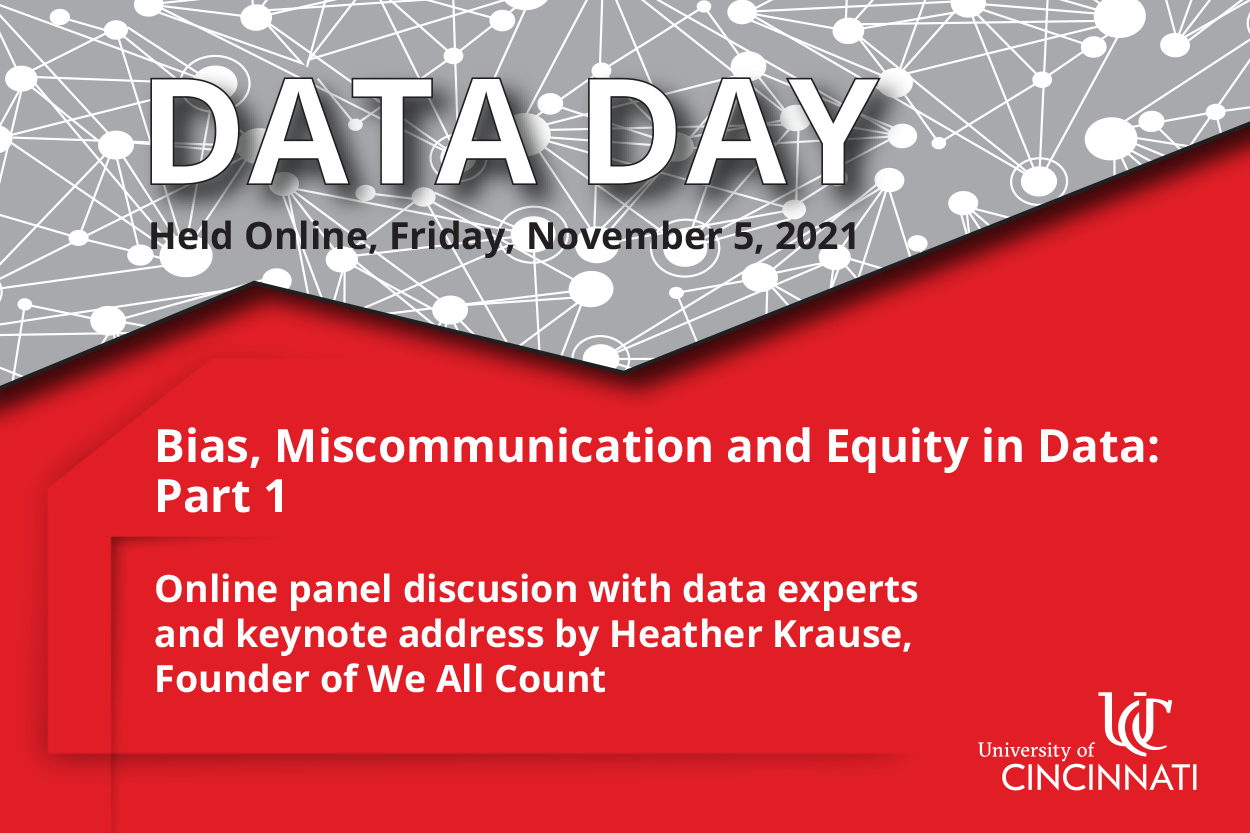
In order for data to be equitable, the processes involved in the data life cycle must consider the ethical nuances of each step in the process. Careful consideration must be paid to the way that we collect, analyze, interpret and distribute data to ensure that bias is not integrated (consciously or unconsciously) into the process. Today we are barraged with information, couched as fact that is misleading, potentially harmful and that is replete with biases. These miscommunications can lead to the reinforcement of negative stereotypes, poor decision making, social upheaval and mistrust of vetted, factual information. Social Media is often a “mixed bag” of facts and fiction, and many have difficulty navigating and drawing the line between them. DATA Day 2021 will take aim at data miscommunication and bias and discuss ways in which data can be re-examined through an equity lens. Registration will be available soon on the DATA Day website.
In October of 2020, we celebrated our 5th Annual DATA Day event. As we prepare for subsequent similar events, we would like to assess the impact of our previous events on those that attended. We are asking that if you have attended any DATA Day event in the past that you would kindly take a few moments to participate in a survey to assess your experiences. Your responses will be confidential unless you choose to submit your contact information for further inquiries regarding the events.
Use this link to access the survey: https://redcap.link/ucdataday. Please know that your feedback is very important to us, and we appreciate your time filling out the survey.

